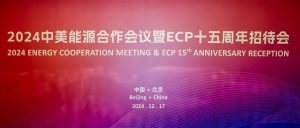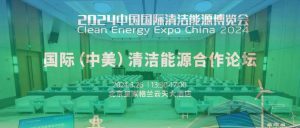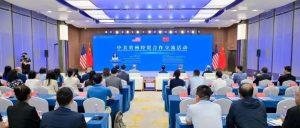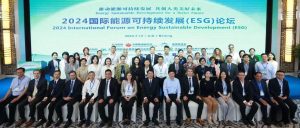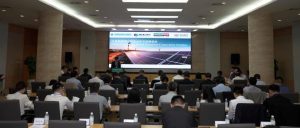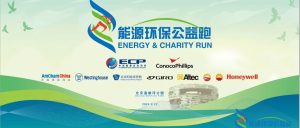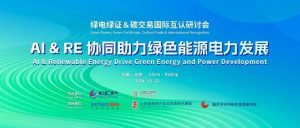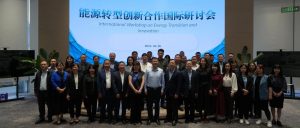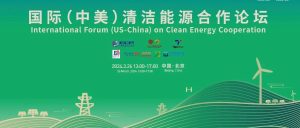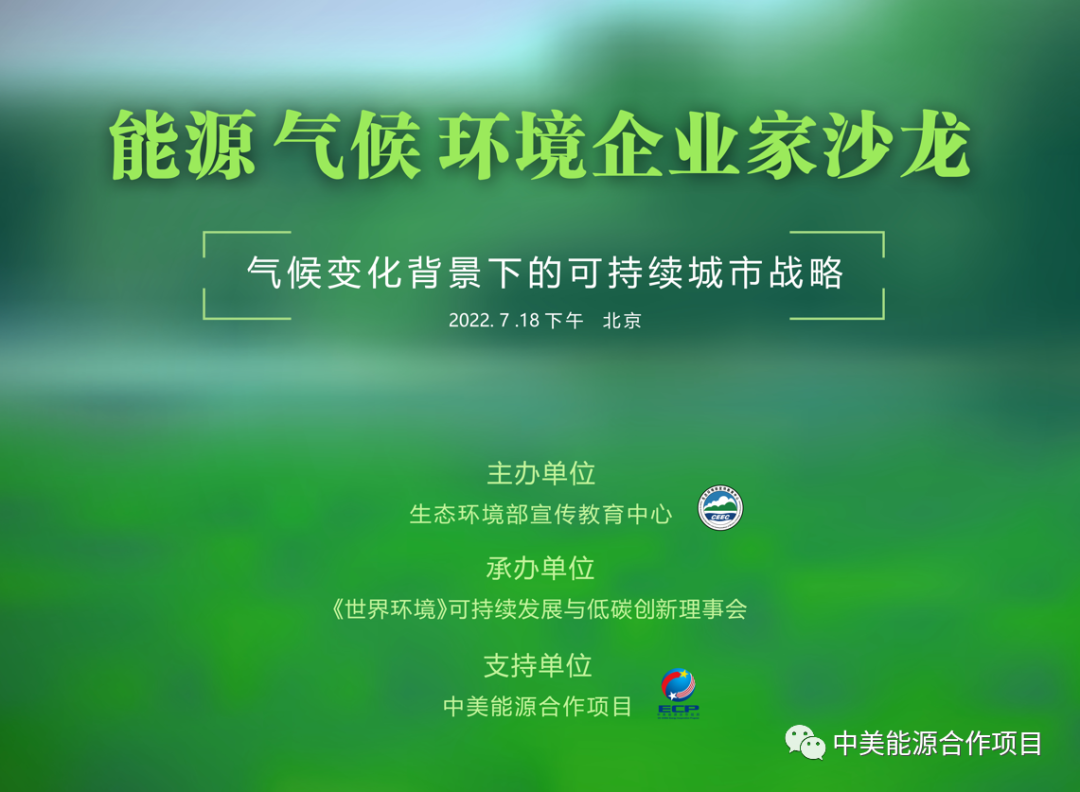
2022年7月18日下午,中美能源合作项目(ECP)支持的以“气候变化背景下的可持续城市战略”为主题的“能源气候环境”系列第一次会议在京举办。该活动由生态环境部宣教中心主办,《世界环境》可持续发展与低碳创新理事会承办。生态环境部宣传教育中心主任田成川主持,科技部原副部长、国家气候变化专家委员会名誉主任刘燕华,霍尼韦尔中国区总裁余锋,中国城市规划协会副会长、清华同衡研究院院长袁昕出席活动并做主旨发言。来自霍尼韦尔、埃克森美孚、康菲石油、贝克休斯、英特尔、必维、燕山石化、红杉资本、中国林业、WWF等30多位代表参加了活动。
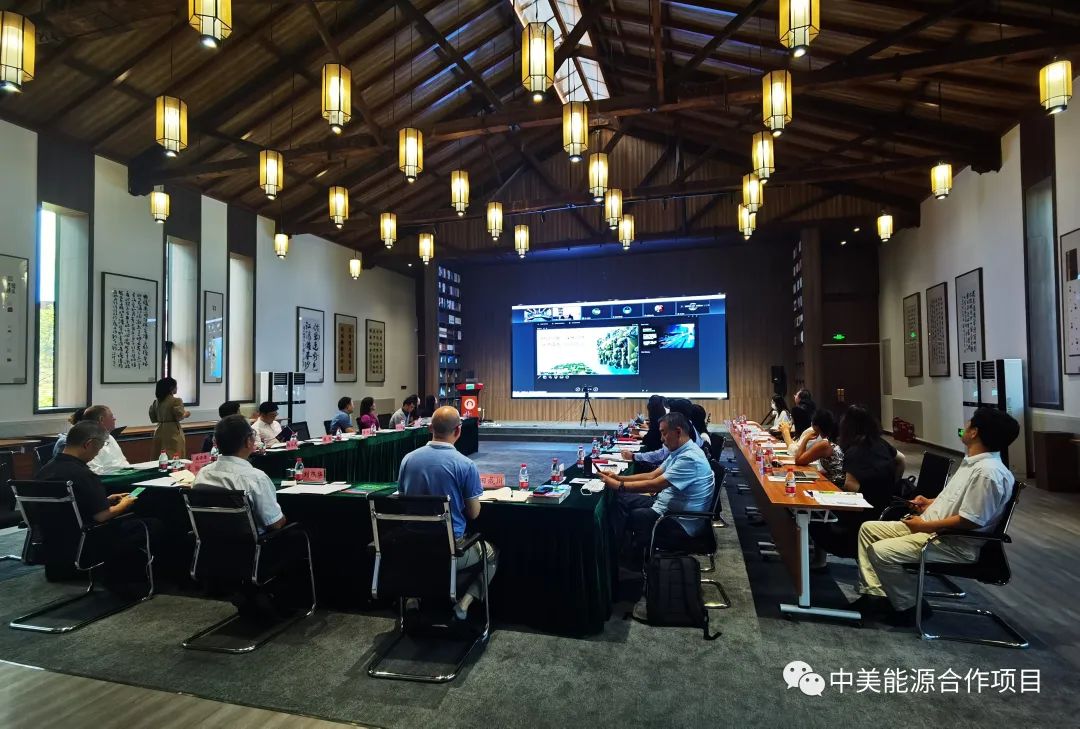
田成川主任指出,气候变化问题是当今人类面临的一个非常严峻而紧迫的挑战,特别是近年来全球气候异常、极端天气频发。应对气候危机,已经刻不容缓。他提到,城市是人类工业文明的主要载体,是现代人类的主要聚体形式,也是能源消费和碳排放的中心,是气候变化影响的重点地区。减缓和适应气候变化,城市是重点。在气候变化大背景下,探讨城市的可持续发展战略是一个非常重大的课题。
科技部原副部长、国家气候变化专家委员会名誉主任刘燕华在致辞时表示,全球大概有55%的人口居住在城市,发达国家的比例达到75%以上,全球城市人口数量今后还会增加。中国2021年城镇人口比例达到了64%,预计到2030年会达到70%-75%。中国目前是温室气体排放大国,二氧化碳排放其中主要集中在城镇,同时城镇也是空气污染相对严重的地方,所以城市是气候变化背景下的重点区域。在“30·60”双碳目标的背景下,低碳城市的标志包括成为新能源创新和建设的引领者、做到能源独立、投资于绿色基础设施等标准要素。
霍尼韦尔中国区总裁余锋做主旨发言时提到,在城市可持续发展中,要思考怎么能够让城市真正融入自然,实现与自然和谐共生,保证城市持续发展治好自身的“城市病”。在助力城市可持续发展中,企业要扮演好持续创新以及深化合作的角色。
清华同衡研究院院长袁昕就气候变化背景下的可持续城市规划策略进行了专题演讲。他从以人为核心的新型城镇化、产业转型与循环经济、区域能源结构转型、建筑节能与低碳城市、绿色低碳交通体系构建、优化城市结构和功能布局、国土空间与生态保护等七个方面总结了可持续城市的规划策略,并进行了案例分享。
在会议发言交流环节,来自各个行业的企业家代表就企业在国家双碳背景下推进城市可持续发展中如何发挥作用展开热烈讨论。
城市项目是以往中美气候变化合作、中美能源领域合作的一个明星项目和重要领域。城市可持续发展也是ECP长期跟踪、关注和支持的重点领域。十多年间,就一直积极参与推动中国城市生态低碳合作示范和国际交流工作。ECP城市项目主席王甦女士,也对未来的城市项目做了展望与分享:未来ECP将继续发挥好政企合作伙伴平台作用,助力城市的低碳可持续高质量发展,与各相关重要方共同探索城市应对气候变化的有效行动方案,寻找实现城市可持续发展的道路,推动更多可操作、可持续、可复制的绿色低碳示范项目落地开花,实现城市与企业的多赢局面。ECP也将继续支持并参与“能源气候环境”这一跨界融合的系列活动,持续关注能源气候环境问题。
Exploring
“Sustainable Urban Strategies in the Context of Climate Change”, the first Energy, Climate and Environment Roundtable was successfully held
in Beijing
On the afternoon of 18 July 2022, the first
event of “Energy, Climate and Environment Roundtable
Series”,supported by the US-China Energy Cooperation Program (ECP), was successfully
held in Beijing with the topic of “Sustainable Urban Strategies in the
Context of Climate Change”. The event was hosted by the Center for
Environmental Education and Communications of Ministry of Ecology and
Environment (CEEC) and organized by the Council for Sustainable Development and
Low Carbon Innovation of the World Environment.
During the event, Tian Chengchuan,
director of CEEC, was invited as the moderator; Liu Yanhua, the former Vice
Minister of the Ministry of Science and Technology and Honorary Director of the
National Expert Committee on Climate Change delivered remarks. William Yu Feng,
the President of Honeywell China, and Yuan Xin, the Vice Chairman of China
Association of City Planning and President of Tsinhua Tongheng Research
Institute, attended this event and delivered keynote speeches. More than 30
representatives from Honeywell, ExxonMobil, ConocoPhillips, BakerHughes, Intel,
BV, Sinopec Yanshan Petrochemical Company, China Forestry Group, and WWF
participated as well.
Dir. Tian Chengchuan pointed out that
the issue of climate change is a very serious and urgent challenge facing
mankind today, especially in recent years when global climate anomalies and
extreme weather occur frequently. There is no time to lose in addressing the
climate crisis. He mentioned that cities are the main carriers of human
industrial civilization, the essential form of modern human aggregation, the
centers of energy consumption and carbon emissions, and the focus areas for
climate change impacts. It is believed that cities are the significant part for
climate change mitigation and adaptation. In the context of climate change,
exploring sustainable urban strategies is a vital topic.
Mr. Liu Yanhua said that roughly 55% of
the world’s population lives in cities, with the proportion in developed
countries reaching more than 75%, and the number of urban populations worldwide
will increase in the future. China’s urban population reached 64% in 2021 and
is expected to reach 70-75% by 2030. Currently China is a major emitter of
greenhouse gases, of which carbon dioxide emissions are mainly concentrated in
cities, which are also places where air pollution is relatively severe, making
cities a key area in the context of climate change. Under the “30-60” dual
carbon goals, the hallmarks of a low carbon city include standards such as
being a leader in new energy innovation and construction, being energy independent,
and investing in green infrastructure.
Mr. William Yu Feng emphasized that in
sustainable urban development, it is important to think about how cities can
truly integrate with nature, achieve harmony with nature, and ensure that
cities can sustainably develop to cure their own “urban diseases”. In
supporting cities sustainable development, enterprises should play a role of
continuous innovation and deepening cooperation.
Mr. Yuanxin in his speech shared how to
promote sustainable urban development strategy in the background of climate
change. He summarized the planning strategies of sustainable cities from seven
aspects, including people-centered new urbanization, industrial transformation
and circular economy, regional energy structure transformation, building energy
conservation and low-carbon city, green and low-carbon transportation system
construction, optimization of urban structure and functional layout, land space
and ecological protection, and shared cases.
During the exchange session,
representatives of entrepreneurs from various industries engaged in a lively
discussion on the role of enterprises in promoting sustainable urban
development in the context of the “dual carbon” goals.
The ECP City Initiative has been a signature
program and an important area of previous bilateral cooperation in climate
change and energy sector. Sustainable
urban development is also a long-standing focus area for ECP to participate and
support. ECP has been actively involved in the promotion of eco-low carbon
cooperation and international exchange in Chinese cities for more than a
decade. Ms. Sue Wang, the ECP City Initiative Chair, also shared her view for
future ECP city initiative. ECP will continue
to play its role as a platform for government and enterprises to help cities
achieve low-carbon sustainable and high-quality development and explore
effective plans to address climate change with all relevant key parties; ECP
will find ways to achieve sustainable urban development and promote more
practical, sustainable, and replicable green and low-carbon demonstration
projects to achieve multi-wins for cities and enterprises. ECP will also
continue to support and participate in the cross-sector “Energy, Climate and
Environment” series, and focus on energy and climate issues.

